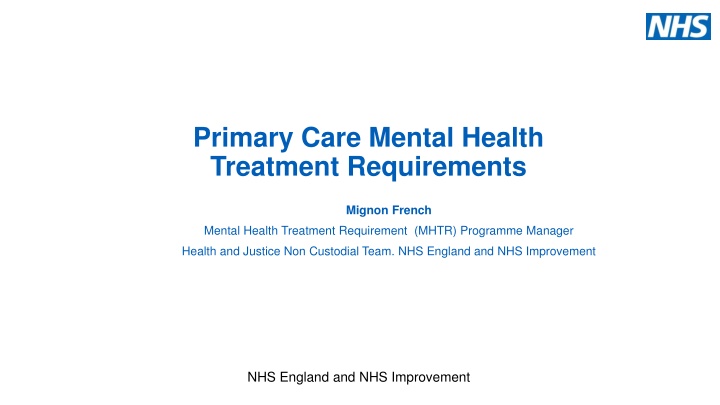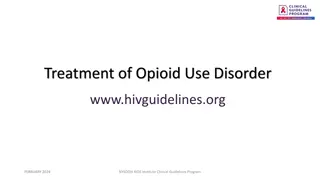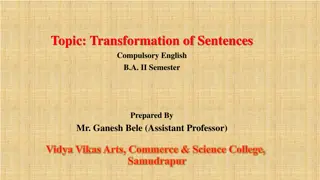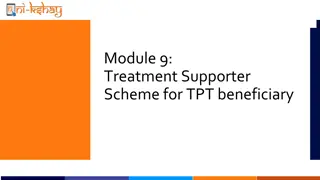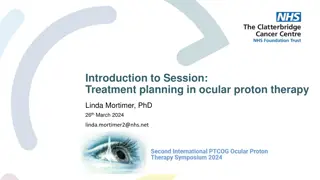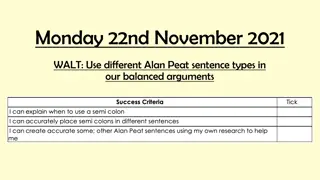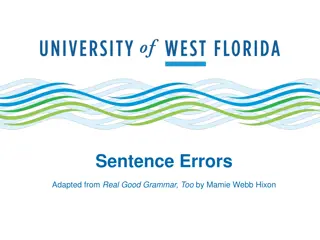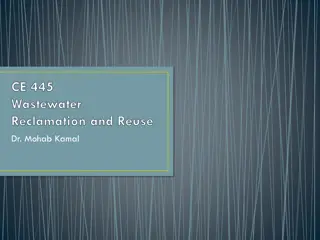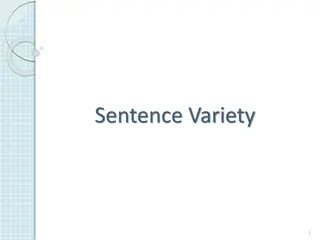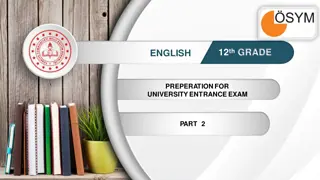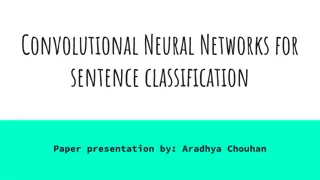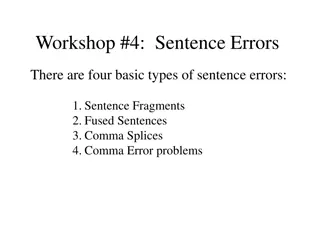Community Sentence Treatment Requirements Overview
Community Sentence Treatment Requirements (CSTRs), including Alcohol Treatment Requirements (ATRs), Drug Rehabilitation Requirements (DRRs), and Mental Health Treatment Requirements (MHTRs), aim to reduce re-offending by addressing underlying mental health and substance misuse issues. Despite high prevalence, the use of treatment requirements remains low. The Primary Care MHTR model offers evidence-based clinical interventions for individuals meeting clinical criteria, with a focus on dual diagnosis and neurodiversity. Enhanced partnership with substance misuse providers enables combined orders if appropriate.
Download Presentation

Please find below an Image/Link to download the presentation.
The content on the website is provided AS IS for your information and personal use only. It may not be sold, licensed, or shared on other websites without obtaining consent from the author.If you encounter any issues during the download, it is possible that the publisher has removed the file from their server.
You are allowed to download the files provided on this website for personal or commercial use, subject to the condition that they are used lawfully. All files are the property of their respective owners.
The content on the website is provided AS IS for your information and personal use only. It may not be sold, licensed, or shared on other websites without obtaining consent from the author.
E N D
Presentation Transcript
Primary Care Mental Health Treatment Requirements Mignon French Mental Health Treatment Requirement (MHTR) Programme Manager Health and Justice Non Custodial Team. NHS England and NHS Improvement NHS England and NHS Improvement
Community Sentence Treatment Requirements Treatment requirements have been a sentencing option since being introduced in the Criminal Justice Act, 2003. o Alcohol Treatment Requirements (ATRs) o Drug Rehabilitation Requirements (DRRs) o Mental Health Treatment Requirements (MHTRs) Despite high numbers of individuals with mental health and substance misuse issues, use of treatment requirements remains low. o In 2019, only 4% of commenced requirements as part of a community order or suspended sentence order were DRRs, 3% ATRs and less than 1% MHTR. Partnership approach to increase the use of all three treatment requirements introduced in Oct 2017 Aims: reduce re-offending and use alternatives to short custodial sentences, directly addressing underlying mental health and substance misuse issues which contribute towards offending behaviour. 2 | 2 |
Primary Care Mental Health Treatment Requirement (PC MHTR) MHTRs are the least used Community Sentence Treatment Requirements (CSTRs) some reasons include: Clinical service availability and lack of dual diagnosis provision Clinical oversight Lack of a clinical model/interventions for this complex vulnerable cohort of individuals Probation have reported: Increasing caseloads of individuals with high levels of complexities Custodial sentences for those who have underlying mental health/substance misuse issues Breaching due to the underlying issues not being addressed. NHS England and NHS Improvement have developed the primary care (PC) MHTR model to directly address these issues. The model includes Evidence based clinical interventions and are inclusive for all individuals who meet the clinical criteria, including those with dual diagnosis/personality disorder/neurodiversity. Criteria for acceptance is based on the mental health assessments, offence (community order or higher threshold) and age. Improved partnership with substance misuse providers is vital to enable the sentencing to combined orders (MHTR/DRR, MHTR/ATR), if appropriate. The MHTR service will include an overseeing Clinical Lead who holds the requirement and provides clinical supervision. primary care practitioners assess the individual and provide the interventions.
A CSTR Site Pre-sentence (Court Duty Officer-CDO) Sentence If guilty plea: MHTR assessment by MH Practitioner ATR/DRR screen by CDO or provider] Referral e.g. from CDO/Liaison & Diversion/Legal Representative MHTR primary care trigger screen: Indicates high levels of psychological distress Court impose community order or SSO to include CSTR. Judiciary to check (if not already covered in PSR): - Individual has given consent - Clinical responsibility agreed - CSTR court review timetable Mental Health Treatment requirements (MHTR): If suitable for MHTR/DRR/ATR and client consents, clinical lead (MHTR) or substance misuse provider (ATR/DRR) contacted Primary care and secondary care Any MH issues and personality disorder problems Range of evidence-based screening tools and assessments used throughout the process, depending on the specific site and individual in question. To be eligible individuals must: Enter a guilty plea or have been found guilty after trial 18+ years old Consent Charged with committing an offence which falls into Community or Suspended Sentence Order (SSO) Date for first appt agreed. Individualised care plan agreed with Providers, Client and Clinical Lead CDO assesses level of risk to self and others Verbal report from CDO for recommendation into Pre sentence report Where possible, on the day sentencing is encouraged 80% of CSTRs sentenced on day in Programme sites CDO makes recommendations to court DRR= Drug Rehabilitation Requirement ATR= Alcohol Treatment Requirements 4 |
Thank you mignon.french@nhs.net NHS England and NHS Improvement
